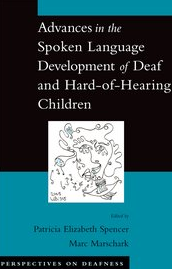Advances in the Spoken-Language Development of Deaf and Hard-of-Hearing Children
Temas
Detalles
Throughout history there have been efforts to help deaf children develop spoken language through which they could have full access to the hearing world. These efforts, although pursued seriously and with great care, frequently proved fruitless, and often only resulted in passionate arguments over the efficacy of particular approaches. Although some deaf children did develop spoken language, there was little evidence to suggest that this development had been facilitated by any particular education approach, and moreover, many, even most deaf children--especially those with profound loss--never develop spoken language at all. Recent technological advances, however, have led to more positive expectations for deaf children's acquisition of spoken language: Innovative testing procedures for hearing allow for early identification of loss that leads to intervention services during the first weeks and months of life. Programmable hearing aids allow more children to make use of residual hearing abilities. Children with the most profound losses are able to reap greater benefits from cochlear-implant technologies. At the same time, there have been great advances in research into the processes of deaf children's language development and the outcomes they experience. As a result, we are, for the first time, accruing a sufficient base of evidence and information to allow reliable predictions about children's progress that will, in turn, lead to further advances.





